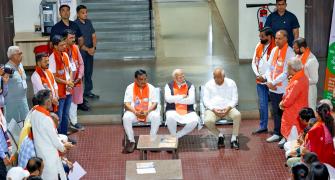Legal music mobile downloads are available, but new measures are being taken to quell piracy.
Come April, high-end cellphone users will not be able to forward 'true tones' -- the ringtone format which can play full songs -- to friends or colleagues at will. Intellectual property protection is to kick in.
Over 125 music industry members of Phonographic Performance Ltd, a representative entity, have agreed to license out only 'protected true tones' from April 1 (monotone and polyphonic tunes will, however, be spared).
There is money at stake. While the overall ringtone market in India is estimated at nearly Rs 200 crore (Rs 2 billion) now, the share of 'true tones' is put at around 20 per cent.
And it is not money to let go. The ringtone market is expected to grow at a compounded annual growth rate of 56 per cent over the next five years, reaching Rs 680 crore (Rs 6.8 billion) by 2010, according to an SSKI research report.
This is in harmony with world trends; the global ringtone market is expected to grow to $5.2 billion in 2006. Meanwhile, ringtones already account for over 10 per cent of the current $32.3-billion worldwide music market.
Better sound quality is acting as a spur. While monotones and polyphonic tunes account for four-fifths of the current ringtone market in India, 'true tones' are expected to overturn this trend in the next six months -- as high-end phones proliferate, notes Sudhanshu Sarronwala, CEO, Soundbuzz, a 'legit' digital music shop on the Internet.
Legal downloads are becoming easier; a user can easily forward a 'true tone' after legally downloading it from an online music site or a mobile service provider. Soundbuzz distributes close to 2.25 million ring tones per month to mobile subscribers.
Mobile operators, meanwhile, sell tunes to their subscribers directly as well. Reliance users reportedly download around 7,50,000 tones per day, while Airtel users download 3,50,000.
By the legal arrangement, the consumer pays for ringtones, and the revenues are shared by music companies, aggregators (which put the tones together for distribution) and mobile operators in a 25:25:50 ratio, roughly.
The trouble for the industry is that most handsets in current use don't support digital rights management (DRM), which prevents one from forwarding ringtones.
Ringtone piracy is rampant, with forwarding popular and preloaded phones widely available. To fight it, PPL is working with the wider telecom industry.
"We are using the open mobile alliance (whose members include handset makers, operators and IT firms) digital rights management technology -- or OMA DRM -- to ensure that 'true tones' cannot be forwarded," says Vipul Pradhan, CEO, PPL-India.
Now, OMA DRM -- think of it as a protective 'wrapping' -- may act as a technical shield. But encouraging customer self-restraint may work better.
Do re me...
-
Monophonic sounds are music with just one 'voice'
-
Polophony is a musical texture consisting of several independent melodic voices
-
True tones boast acoustics that sound quite like a regular recorded song
-
Mobile music downloads in India are currently valued at Rs 400 crore (Rs 4 billion) per annum
-
Rs 50 to 60 crore (Rs 500 to 600 million) was paid in royalty to the music industry in the past 18 months
-
Record company revenues from digital music, globally, topped $1 billion in 2005
(Sources: IFPI:06 Digital Music Report and Soundbuzz)
Do you want to discuss stock tips? Do you know a hot one? Join the Stock Market Investments Discussion Group








